The Determination of Success of R&D Projects: Evidence from American-Israeli Research Alliances, Science, Technology and the Economy Program STE-WP-8-2001
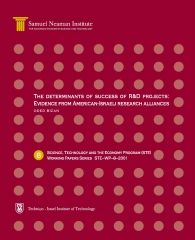
A basic premise of Israeli R&D support programs has been the principle of neutrality all eligible projects are funded. With a binding budget constraint, however, the government has to select the projects it funds and thus to depart from neutrality. An optimal departure would favor those projects that have less of a chance to succeed […]
Cooperation and Competition in R&D with Uncertainty & Spillovers, Science, Technology and the Economy Program STE-WP-6
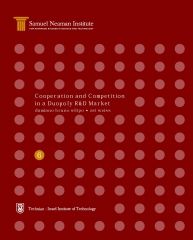
In a general setting with uncertainty and spillovers in R&D activity, we consider the incentive to cooperate among firms at any or all of the following three stages. Firms can jointly agree on the level of R&D expenditures, they can set up joint research facilities, and/or they can engage in an information sharing agreements, by […]
Defense R&D and Economic Growth in Israel: A Research Agenda, Science, Technology and the Economy Program STE-WP-4
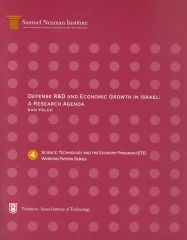
When evaluating Israel’s high-tech capabilities and impressive economic achievements since inception, it is difficult not to recognize the important role played by defense and military developments. In particular, defense-related R&D had significant impacts on, as much as it was aided by, Israel’s industrial sector, higher educational system in science and engineering, research community, and the […]
Public Policy, Locational Choice and the Innovation Capability of High-Tech Firms: A Comparison Between Israel and Ireland – SNI R&D Policy Papers Series
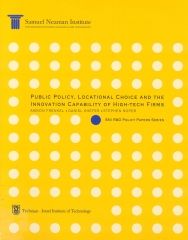
Using survey data from Irish and Israeli firms we examine the influence of public policy on the characteristics, location and innovation capability of high-tech firms. In Israel the innovation activities of Israeli firms are found to be much more locationally sensitive than that of Irish companies. Regional policy incentives, involving the dispersal of high-tech firms […]
R&D, Firm Size and Innovation: An Empirical Analysis, SNI R&D Policy Papers Series
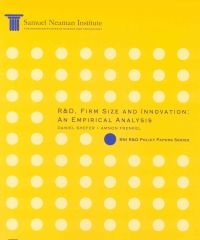
Investment in R&D spawns innovations, which in turn foster economic growth. In recent years, researchers have become increasingly aware of the role of industrial innovation in the rate of regional development and economic growth. In order to innovate, firms must invest in R&D (in-house or out-sourcing), and engage highly skilled labor that is able to […]
Investments in Civilian Research & Development in Israel: Background Data for Development of a National Policy

Israel is basing its progress and prosperity on human capital (quality manpower) and unique knowledge. The outstanding expression of this is the development of an industry based on advance knowledge which in the last decade led Israel to an impressive average economic growth of 5%, of which 30% stem from high-tech industry (1). In spite […]
Targeting Industries for Regional Development in Israel and in Germany – A Comparative Study, SNI R&D Policy Papers Series
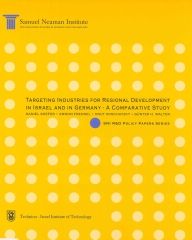
Economic growth is driven to a large extent by technological progress and innovation. It is therefore essential for effective public policy to identify the group of innovative industries so that policy makers will be able to target government incentive programs toward this specific group of industries. In the present study we assumed that innovation is […]
R&D, Subsidies and Productivity, Science, Technology and the Economy Program STE-WP-7
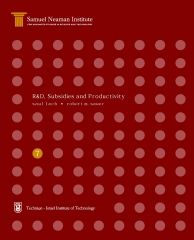
In this paper we formulate a model that extends the traditional theoretical literature on the optimal management of an R&D project by emphasizing the model’s empirical and policy implications. We solve the firm’s dynamic problem and use the resulting optimal R&D policy to assess the role of subsidies aimed at stimulating R&D activities. The theoretical […]
Sources of U.S. Longevity Increase, 1960-1997, Science, Technology and the Economy Program STE-WP-3
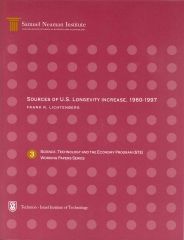
Between 1960 and 1997, life expectancy at birth of Americans increased approximately 10%–from 69.7 to 76.5 years—and it has been estimated tha t the value of life extension during this period nearly equaled the gains in tangible consumption. While life expectancy has tended to increase, there have been substantial fluctuations in the rate of increase. In […]
Managing New Product Development and Innovation A Microeconomics Toolbox
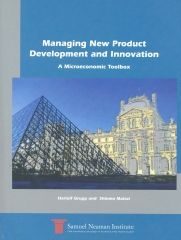
Comprising over a decade of research the fifteen chapters in this book offer a selection of practical microeconomic tools for managing new product development and innovation. An overall theme unites these tools feature-based innovation. By quantifying product features and evaluating the costs and market value of improving each , a simple yet powerful conceptual framework […]
